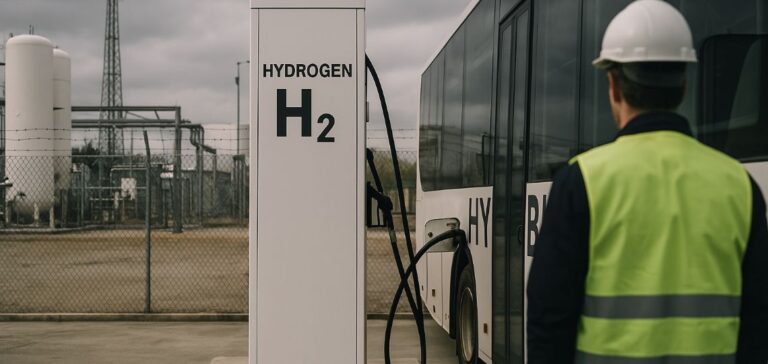Independent energy company Qair, in partnership with the Regional Energy and Climate Agency (AREC) Occitanie, has confirmed the launch of its first hydrogen station in the Méridienne Business Park, located in Béziers. The facility, expected to be operational by the end of 2025, is part of a broader initiative to establish a territorial ecosystem around renewable hydrogen. It will distribute up to 600 kilograms of hydrogen per day, primarily serving the bus fleet of the Béziers Méditerranée urban community.
A project backed by regional production via Hyd’Occ
The Béziers station will be supplied by Hyd’Occ, a forthcoming renewable hydrogen production unit located in Port-La Nouvelle. Regarded as the largest facility of its kind in France, its initial phase will have a capacity of 20 megawatts to produce 2,700 tonnes of hydrogen per year. This output will later double to 5,400 tonnes annually with an expanded capacity of 40 megawatts. The hydrogen produced will be used to supply several stations across the Occitanie region, starting with Béziers.
A European corridor for heavy-duty mobility
The initiative forms part of the “Corridor H2 Occitanie” programme, supported by the European Investment Bank, the European Union via the Connecting Europe Facility (CEF), and the French Agency for Ecological Transition (ADEME). This corridor is designed to establish a zero-emission transport axis for heavy-duty mobility, linking the Iberian Peninsula with northern Europe. The Béziers station is one of the awarded projects under ADEME’s “Territorial Hydrogen Ecosystems” call for proposals.
Territorial workshops and industrial engagement
Alongside infrastructure deployment, Qair is organising a series of workshops with Territoires Alternatifs aimed at mobilising local stakeholders around hydrogen-based solutions. On 21 March, Béziers hosted one of these events, bringing together vehicle manufacturers, public authorities and industrial players. The previous workshop, held on 17 January in Narbonne, included technical site visits to the Louise Michel vocational high school and the Hyd’Occ facility.
Guirec Dufour, Managing Director of Qair France, stated that the project represents tangible progress in developing hydrogen solutions for mobility and industry. Stéphane Péré, Managing Director of AREC, added that the station forms part of the Green Hydrogen Regional Plan and the wider strategy to establish Occitanie as a positive-energy region.






















